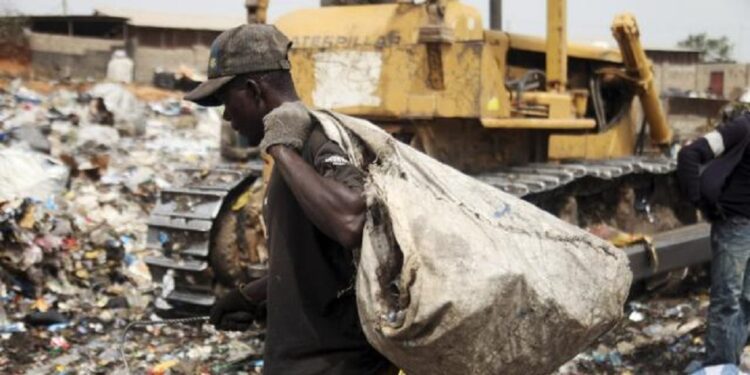The Institute for Peace and Conflict Resolution (IPCR) in collaboration with Netherlands-based INCLUDE, has intensified efforts to bring waste collectors otherwise known as scavengers into the mainstream of the Nigerian economy by improving their activities.
Indications to this development emerged during a stakeholders validation workshop tagged “Formalising the Scavenger Economy for Sustainable Development in Nigeria” which was held in Abuja on Friday, aimed at ending stigmatisation, marginalisation and profiling if the waste pickers also known as Baban bola in Hausa language.
Director general of the Institute, Dr. Joseph Ochogwu, said in his remarks that the IPCR and its partners embarked on a research about the activities of the waste pickers and dump sites in Abuja and Lagos, to ascertain their conditions even as the research made far-reaching recommendations on how to provide medical care, funds, loans, grants, security and generally transform the sector to add more value to the Nigerian economy.
Dr. Ochogwu noted that the scavengers help in the recycling process which has added billions of Naira to the Nigerian economy, stressing that the public must be made to end the exclusion towards the waste management system.
He said “Whether we like it or not, scavengers are very important to the waste management ecosystem. As a matter of fact they are the frontline people. As humans we produce waste on a daily basis and these are the people that help us to pick them up.
“From the waste areas to the garbage dump they are everywhere and it’s so unfortunate to note that they suffer stigmatisation. Some see them as security threats while others tag them as a thief which is not supposed to be so. They are neglected by society which is why we decided to undertake this research.”
He also appreciated partners from the Netherlands for providing funding to enable IPCR carry out the research both in Abuja and Lagos.
He said “this research took us to one of the largest dump sites in Lagos and you need to see how people live in this site. We also looked at the level of vulnerability of the people there both adults and children and this calls for policy concerns on why we need to zoom in and provide policies through research on this group of people because they are very essential to our lives.”
He urged stakeholders to pay attention to the waste pickers’ access to healthcare, inclusion in terms of finances and other basic amenities, adding that there was a need for them to have the National Identity Numbers (NIN) to enable them to have access to facilities like the bank etc.
Knowledge manager of INCLUDE Olaoluwa Abagun, in her remarks, said the organisation’s mandate is to bridge the gap between research and policy making for inclusive development.
She said “We are funded by the Dutch Ministry of Foreign Affairs and we are Africa -focused to create relevant research and facilitate knowledge exchange and convene policy dialogue on critical issues around inclusive development. We’ve worked on social protection, digitalisation, low carbon transition and opportunities for young people across the continent.
“This research is super critical to us because we are zooming in on an abandoned area of research which is scavengers or waste pickers in layman’s terms and how much they contribute to the Nigerian economy. Billions of naira are accounted for due to the exports that are made as a result of their efforts.
“But unfortunately when we look at the policy landscape and social perception on waste pickers, it is not so much to write home about there are a lot of gaps in policies and engagement with the broader waste management ecosystem and being recognized as full human beings.”
She called for harmonised policies to incorporate the scavengers into the formal economy.



